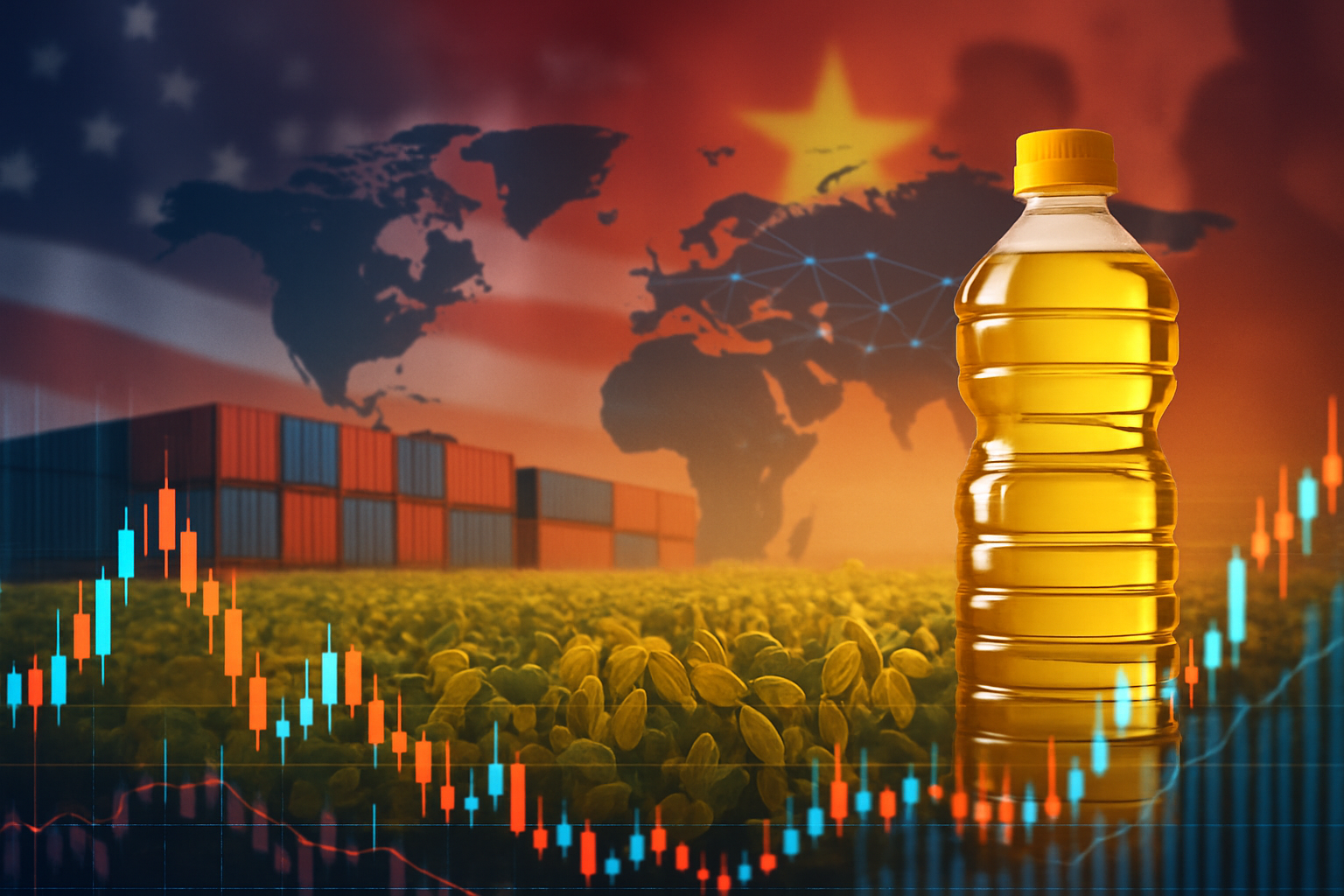
New York, NY – October 15, 2025 – Shares of Bunge Global SA (NYSE: BG) experienced a significant surge today, climbing over 12% to $92.71, positioning the agribusiness giant as a top performer in the S&P 500. This dramatic uptick is directly linked to a pivotal announcement by former President Donald Trump, who threatened to impose restrictions on U.S. imports of cooking oil from China, citing an "Economically Hostile Act" by Beijing. The proposed policy shift signals a potential boon for domestic agricultural processors like Bunge, poised to capitalize on increased demand for domestically produced soybean oil.
The immediate implications for Bunge are overwhelmingly positive, as the company stands to benefit from reduced foreign competition and a likely surge in U.S. crushing activity. For the broader cooking oil market, however, the landscape is becoming increasingly volatile, with intensified price fluctuations and a significant reshaping of global supply chains. This development further escalates the ongoing U.S.-China trade conflict, adding another layer of complexity to an already strained global commodities market grappling with geopolitical tensions, adverse weather conditions, and robust demand from the biofuel sector.
Unpacking the Trade Gauntlet: Trump's Cooking Oil Ultimatum and its Genesis
The latest salvo in the protracted U.S.-China trade dispute was fired on October 14, 2025, when former President Donald Trump took to Truth Social, threatening to restrict U.S. imports of cooking oil from China. Trump's rationale was unequivocal: he accused China of an "Economically Hostile Act" by deliberately ceasing purchases of American soybeans, thereby causing hardship for U.S. farmers. "We can easily produce Cooking Oil ourselves, we don't need to purchase it from China," Trump declared, signaling a potential retaliatory measure to protect domestic agriculture. This announcement closely followed a previous threat on October 10 to impose 100% tariffs on all Chinese imports starting November 1, a response to China's recent tightening of rare earth export restrictions.
This escalation is deeply rooted in a trade war that commenced in January 2018. The initial imposition of U.S. tariffs on solar panels, washing machines, steel, and aluminum was met with swift retaliation from China, including a critical 25% tariff on U.S. soybeans in April 2018. This marked a watershed moment, as China, historically the largest global buyer of soybeans, began strategically diversifying its agricultural suppliers. Despite the "Phase One" trade deal signed in January 2020, where China pledged to increase U.S. farm product purchases, its reliance on American soybeans steadily dwindled. By 2024, the U.S. share of China's soybean imports had plummeted from 40% to a mere 18%, with Brazil and Argentina emerging as primary beneficiaries. As of October 9, 2025, U.S. soybean prices were reportedly below production costs, exacerbated by China placing virtually no new-crop export orders for the 2025/26 marketing season.
Key players in this high-stakes economic drama include the U.S. Government, with figures like former President Trump, U.S. Trade Representative Jamieson Greer, and Treasury Secretary Scott Bessent steering policy. On the Chinese side, President Xi Jinping and various ministries dictate trade responses. Crucially, the American agricultural sector, particularly soybean farmers, bears the brunt of China's reduced purchases, while the burgeoning U.S. biofuel industry, a significant consumer of used cooking oil (UCO), faces uncertainty over feedstock supplies. Global soybean suppliers like Brazil and Argentina are also major stakeholders, having reshaped their export strategies to meet China's demand. Within the U.S. cooking oil market, major players such as Cargill, Archer Daniels Midland (NYSE: ADM), Bunge (NYSE: BG), and Conagra Brands (NYSE: CAG) are closely watching developments.
Initial market reactions to Trump's October 14 announcement were immediate and volatile, with U.S. market capitalization reportedly shedding $450 billion within minutes, and the S&P 500 briefly turning negative. However, some analysts and Chinese UCO traders suggested that the direct impact of restricting cooking oil imports might be "minimal" in the short term. This assessment stems from the fact that Chinese UCO exports to the U.S. had already sharply declined by 65% in the first eight months of 2025 due to China cutting tax rebates and pre-existing U.S. tariffs. Nevertheless, the move is seen as a potent political statement aimed at reassuring the U.S. agriculture industry. This trade threat unfolds against a backdrop of already elevated global cooking oil prices, driven by the Russia-Ukraine war, robust demand from the biofuel sector, and China's long-term strategy of agricultural import diversification, all contributing to a highly sensitive and unpredictable market environment.
Corporate Fortunes in the Crosshairs: Winners and Losers in a Shifting Trade Landscape
Former President Trump's declaration on October 14, 2025, to potentially restrict U.S. cooking oil imports from China, primarily targeting used cooking oil (UCO), is poised to reshape fortunes across the agricultural processing and biofuel sectors. While the direct trade volume of Chinese UCO to the U.S. has already plummeted due to existing tariffs and tax rebate cuts, the policy reinforces a protectionist stance that will create distinct winners and losers among public companies.
At the forefront of the beneficiaries is Bunge Global SA (NYSE: BG), the world's largest oilseed processor, whose shares surged dramatically on the news. With extensive soybean crushing operations in the U.S., Bunge is ideally positioned to meet increased domestic demand for soybean oil and other plant-based oils and fats. Reduced competition from cheaper Chinese imports, even if already diminished, creates a more favorable pricing environment and higher utilization rates for Bunge's domestic assets. Similarly, Archer Daniels Midland (NYSE: ADM), another agribusiness behemoth, saw its stock gain. ADM's significant footprint in soybean processing and biofuel production means it stands to benefit from a policy that champions U.S.-sourced agricultural products, potentially boosting its domestic crushing margins and sales of soybean oil.
Conversely, companies that had any lingering reliance on Chinese UCO imports, particularly for their biofuel operations, face immediate challenges. While the volume has decreased, the complete cessation of this supply channel means higher sourcing costs or the need for rapid diversification of feedstock. Though not publicly traded, Cargill, a global agricultural giant, also faces a mixed bag. While its U.S. operations could benefit from increased domestic demand, its extensive global reach makes it vulnerable to China's potential retaliatory measures and the broader complexities of international trade disputes, especially concerning its South American sourcing strategies.
The U.S. biofuel industry, a critical consumer of UCO, faces the most intricate adjustments. Producers utilizing domestic feedstocks, particularly soybean oil, stand to gain from increased demand and supportive policies like the Clean Fuel Production Credit (45Z) under the Inflation Reduction Act, which will increasingly prioritize North American feedstocks from 2026. The National Oilseed Processors Association (NOPA) views robust domestic biofuel policies as essential for absorbing surplus soybean production, a sentiment that aligns with this new trade directive. However, biofuel companies that had defended or relied on imported Chinese UCO, even if volumes were declining, will now contend with a tighter, more expensive market for low-carbon feedstocks. The U.S. became a net importer of UCO in 2022, with China being a top supplier in 2023 and 2024, highlighting the scale of the sourcing challenge. The sudden curtailment necessitates a scramble for alternative waste-based feedstocks or a greater pivot towards virgin vegetable oils, impacting operational costs and supply chain stability across the sector.
A Broader Lens: Geopolitical Ripples and Industry Transformation
Former President Trump's October 14, 2025, threat to restrict U.S. cooking oil imports from China, while specifically targeting used cooking oil (UCO), transcends a mere commodity dispute. It represents a significant escalation in the ongoing U.S.-China trade conflict, fitting into a broader trend of economic decoupling and nationalistic trade policies. This move will send ripple effects through global agricultural commodity markets, the burgeoning renewable fuels industry, and international supply chains, echoing historical precedents of trade wars.
The event underscores a critical trend in agricultural commodities: the increasing intertwining of food and fuel markets. The global vegetable oil market is experiencing robust growth, driven by traditional food consumption, but increasingly by the insatiable demand from the renewable fuels sector for feedstocks like UCO, soybean oil, and canola oil. The U.S. biofuel industry, buoyed by incentives like the Renewable Fuel Standard (RFS) and Low Carbon Fuel Standards (LCFS), has become a major consumer, leading to a surge in UCO imports, with China historically being a dominant supplier. However, China's own recent policy shifts, including the removal of export tax credits for UCO, already signaled a strategic move to bolster its domestic biofuel production, effectively reducing its UCO exports to the U.S. even before Trump's announcement.
The ripple effects of this policy will be multifaceted. For the U.S. biofuel industry, a tightening supply of low-carbon intensity feedstocks like UCO is inevitable. This will likely drive up feedstock costs for renewable diesel and biodiesel producers, potentially impacting their profitability and ability to meet regulatory mandates. The U.S. will be forced to accelerate its search for alternative UCO sources, possibly from other Asian nations or Europe, creating new trade routes and increasing global competition for these valuable waste products. Conversely, China will likely redirect its UCO exports to other markets, further altering global trade flows. This reshuffling, combined with existing geopolitical conflicts and climate-induced supply disruptions, will undoubtedly exacerbate price volatility in global edible oil markets, impacting both food and fuel prices worldwide.
Beyond the immediate trade implications, this policy carries significant regulatory and broader policy ramifications. It intensifies the "food vs. fuel" debate, as competition for vegetable oils between these sectors heats up, potentially prompting discussions on prioritizing certain end-uses amid rising food inflation. Furthermore, a sustained shortage of low-carbon feedstocks could necessitate adjustments to the RFS and LCFS targets or credit mechanisms, challenging the feasibility of meeting ambitious clean fuel goals. Historically, U.S. farmers have received government aid during trade disputes, and a renewed trade conflict impacting agriculture could trigger similar calls for federal assistance. This latest move by former President Trump also signals a potential return to an aggressive "America First" trade agenda, which could strain relationships with U.S. allies and lead to a broader resurgence of tariffs and trade barriers.
The most direct historical parallel is the U.S.-China trade war initiated in 2018 under the Trump administration. That period saw China retaliate against U.S. tariffs by targeting key agricultural exports like soybeans, pork, and corn, devastating American farmers and fundamentally reshaping global commodity flows as China pivoted to South American suppliers like Brazil and Argentina. Despite a "Phase One" trade deal, many tariffs remained, and China never fully met its agricultural purchase commitments. This new cooking oil restriction, while focused on a different commodity, echoes those past tactics, underscoring a persistent inclination to use trade policy as an economic weapon, with potentially unpredictable consequences for global markets and a renewed financial burden on American agriculture.
The Road Ahead: Navigating a Fragmented Future for Global Commodities
Former President Trump's declaration on October 14, 2025, to potentially terminate U.S. trade in cooking oil with China marks a critical juncture for agricultural commodities and renewable fuels, setting the stage for a period of profound reorientation. The short-term will be characterized by heightened market volatility and immediate supply chain adjustments, while the long-term outlook points towards a more fragmented global trade landscape and an intensified focus on domestic production and diversified sourcing.
In the immediate future, the agricultural commodities market, particularly soybeans, faces continued disruption. China's steadfast refusal to purchase U.S. soybeans, valued at approximately $12.6 billion in 2024, is the core driver of these trade tensions, leaving American farmers under significant financial strain. The cooking oil restriction, while aimed at retaliation, will likely contribute to further price volatility for edible oils globally. For the renewable fuels market, the short-term challenge is feedstock scarcity. Despite existing tariffs and China's reduced UCO exports, the U.S. biofuel industry's reliance on imported UCO has been substantial. This restriction will immediately tighten the supply of low-carbon feedstocks, leading to increased competition and higher prices for domestic alternatives, potentially impacting biofuel production targets for 2025 and 2026.
Looking further ahead, the long-term possibilities suggest a significant re-drawing of global trade maps. China's UCO exports will likely be redirected to Europe and other Asian markets, while the U.S. will aggressively seek to bolster its domestic oilseed crushing and UCO collection infrastructure to reduce reliance on imports. This will necessitate substantial investment in new processing facilities and innovation in feedstock development. Both the U.S. and China will continue to diversify their agricultural trade partners, solidifying new alliances and trade routes, with South American nations like Brazil and Argentina set to benefit from China's continued soybean demand.
Key players like Bunge (NYSE: BG) will need to execute strategic pivots. Bunge is expected to further diversify its sourcing and processing operations away from China, potentially expanding its crushing capacity in North America to capitalize on increased domestic demand for soybean oil. Their ability to manage crushing margins and integrate deeper into the renewable fuels supply chain will be crucial. The U.S. biofuel industry, meanwhile, must accelerate efforts to enhance domestic feedstock collection, invest in new crushing capacity, and explore novel feedstocks. Intense lobbying for consistent and favorable federal policies, such as the Renewable Fuel Standard (RFS) volumes and the 45Z clean fuel production credit, will be paramount to navigate these challenges.
Emerging market opportunities include significant growth in the U.S. domestic oilseed sector, leading to job creation and economic growth in rural areas. New export markets will open for Chinese UCO, and other countries could see increased demand for their vegetable oils and waste fats as the U.S. seeks to diversify its feedstock sources. However, challenges abound, including persistent supply chain disruptions, increased operating costs for biofuel producers, and a potential exacerbation of the "food vs. fuel" debate, especially if higher demand for biofuel feedstocks drives up food prices.
Several scenarios could unfold for the U.S.-China trade relationship and the global cooking oil supply chain. A "continued escalation" scenario would see further retaliatory measures, leading to significant economic decoupling and a highly fragmented global market. A "strategic diversification and re-shoring" scenario envisions both nations actively pursuing independent supply chains, with new, more regionalized trade routes emerging. Finally, a "partial resolution/de-escalation" scenario, perhaps following high-level negotiations, could see some easing of tensions, though companies would likely maintain diversified supply chains due to the inherent volatility of the relationship. Each scenario presents distinct challenges and opportunities, underscoring the need for adaptability and foresight from market participants.
The Unfolding Saga: Market Outlook and Investor Vigilance
The announcement by former President Donald Trump on October 14, 2025, regarding potential restrictions on U.S. cooking oil imports from China, while symbolically potent, arrives amidst a landscape already reshaped by escalating trade tensions and prior policy shifts. While some analysts suggest the immediate practical impact on cooking oil trade might be "minimal" due to pre-existing tariffs and China's reduced UCO exports, this development unequivocally signals a continued and potentially intensified period of trade friction between the world's two largest economies.
Key Takeaways: The core takeaway is the reinforcement of an aggressive U.S. trade stance, driven by China's sustained halt on U.S. soybean purchases. This specific cooking oil restriction, largely targeting used cooking oil (UCO), builds upon a series of earlier U.S. tariffs and changes in U.S. tax credits that already curtailed Chinese UCO imports, coupled with China's own termination of UCO export tax rebates. Thus, while the headline is striking, the market had already begun to adjust to a reduced flow of Chinese UCO.
Assessment of the Market Moving Forward: The market for agricultural commodities will remain highly volatile. U.S. soybean farmers continue to bear the brunt of China's retaliatory tariffs, which have effectively shut them out of their largest market. China's pivot to South American suppliers like Brazil and Argentina appears entrenched, causing significant financial strain and depressed prices for American growers. While the Trump administration has indicated potential aid packages, farmers consistently express a preference for stable market access. The broader agricultural sector will continue to be heavily influenced by geopolitical developments and the unpredictable nature of U.S.-China trade negotiations.
For the renewable fuels market, the restriction on Chinese cooking oil, even if already diminished, will contribute to a tighter supply of low-carbon feedstocks. This could lead to increased production costs for U.S. biofuel producers and an accelerated push to secure alternative, potentially more expensive, domestic or non-Chinese feedstocks. The industry will likely intensify its lobbying for robust domestic policies to ensure a stable and affordable feedstock supply, balancing environmental goals with economic realities.
Significance and Lasting Impact: This event underscores a deepening economic and geopolitical rift between the U.S. and China. The "tit-for-tat" nature of these trade actions, including China's recent restrictions on rare earth exports, indicates a protracted period of trade friction. The lasting impact will likely include:
- Supply Chain Restructuring: Companies and nations will continue efforts to diversify supply chains away from reliance on either the U.S. or China, prioritizing security and redundancy over mere cost efficiency.
- Elevated Volatility: Agricultural commodity markets will likely experience sustained volatility, making long-term planning difficult for farmers and agribusinesses.
- Government Intervention: Expect continued government involvement through subsidies or aid packages to support affected domestic industries, particularly agriculture.
- Shifting Global Trade Flows: China's continued diversification of agricultural imports away from the U.S. could lead to more entrenched shifts in global trade patterns, potentially benefiting other agricultural exporters.
What Investors Should Watch For in Coming Months: Investors must remain vigilant and adaptable in this evolving landscape.
For Bunge (NYSE: BG), the primary focus should be on the approval of its massive $8.2 billion takeover of Glencore Plc-backed Viterra. China's antitrust approval is currently stalling, and a collapse of the deal due to Chinese resistance would trigger a significant $400 million termination fee for Bunge. Investors should closely monitor any progress or setbacks in this merger, as well as Bunge's quarterly earnings for impacts from commodity price fluctuations and broader trade tensions.
For the broader agricultural sector, key indicators include:
- U.S.-China Trade Negotiations: The upcoming meeting between former President Trump and President Xi Jinping, possibly on the sidelines of the APEC summit later this month, is critical. Any announcements regarding de-escalation or new trade agreements would significantly impact commodity prices.
- Tariff Developments: New tariff announcements or changes to existing rates, particularly on major agricultural products like soybeans, will directly influence market dynamics.
- Government Support Programs: Details of any new U.S. government aid packages for farmers will be important for mitigating financial distress.
Regarding U.S.-China trade relations in general, investors should:
- Differentiate Rhetoric from Action: Understand that political rhetoric can cause immediate market jitters, but long-term impact hinges on concrete policy implementations.
- Scope of Trade Deals: Assess whether any future agreements are comprehensive or merely provide "tactical relief" for specific sectors, as this will determine broader market stability.
- Non-Tariff Barriers: Beyond tariffs, watch for the imposition of non-tariff barriers, such as export controls or regulatory hurdles, which can also significantly disrupt trade.
In conclusion, while the immediate impact of restricting Chinese cooking oil imports might be limited due to prior market adjustments, the announcement is a strong signal of continued trade friction. Investors should brace for ongoing volatility in agricultural markets and closely monitor U.S.-China trade negotiations for any signs of de-escalation or further escalation, as these will profoundly shape the landscape for agricultural commodities, renewable fuels, and key agribusinesses like Bunge.
This content is intended for informational purposes only and is not financial advice





